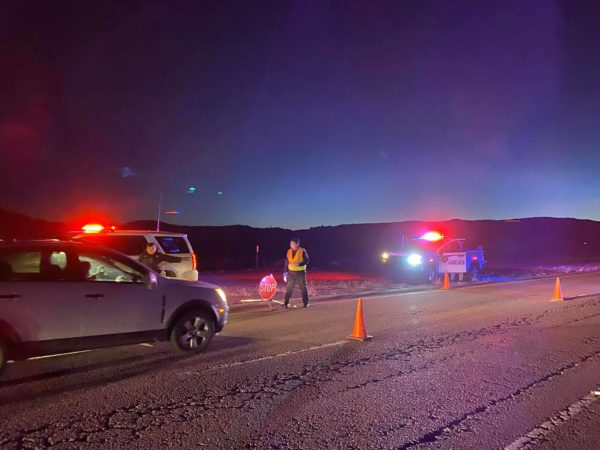
- Details
- By Native News Online Staff
WINDOW ROCK, Ariz. — Beginning Friday, April 10 at 8:00 p.m. and lasting until Monday at 5:00 a.m., Navajo Nation will be under a 57-hour curfew to slow the spread of Dikos Nstaaígíí-19 (COVID-19) on the country’s largest Indian reservation.
The 57-hour curfew takes place over Easter weekend. It was put in place by the Navajo Department of Health.
“The public health emergency order is intended to restrict the movement of Navajo citizens during the full weekend curfew. We are seeing way too many people contract the virus and we need to step up measures to begin to reduce the numbers,” Navajo Nation Jonathan Nez said.
“Our health-care system cannot manage the growing numbers of patients and those who need to be admitted. We continue to receive reports of people on the road and traveling with families to nearby border towns.”
The emergency order states that all individuals on the Navajo Nation shall comply with the weekend curfew, and failure to comply will result in a citation and fine. In addition, the Navajo Police Department will increase the number of checkpoints along roadways across the Navajo Nation to further enforce the Stay-at-Home Order and curfew.
The emergency order further states that individuals are to remain home during the curfew, except in the event of an emergency. The weekend curfew does not apply to essential employees, including medical providers and first responders, which are required to show proof of official identification or letter of designation from their essential business employer on official letterhead. Other essential businesses are encouraged to limit operations during the curfew.
In the meantime, the Navajo Nation’s daily curfew remains in effect from 8:00 p.m. to 5:00 a.m. The curfew does not apply to essential employees reporting to or from duty, with official identification and/or a letter of designation from their essential business employer on official letterhead, which includes a contact for verification.
For more information, including reports, helpful prevention tips, and more resources, please visit the Navajo Department of Health's COVID-19 website at http://www.ndoh.navajo-nsn.gov/COVID-19. To contact the main Navajo Health Command Operations Center, please call (928) 871-7014.
More Stories Like This
Native News Weekly (August 25, 2024): D.C. BriefsUS Presidents in Their Own Words Concerning American Indians
Two Murdered on Colville Indian Reservation
NDAA passes House; Lumbee Fairness Act Advances
NFL, Vikings to Host Native All-American Game, Youth Flag Clinic
Help us defend tribal sovereignty.
At Native News Online, our mission is rooted in telling the stories that strengthen sovereignty and uplift Indigenous voices — not just at year’s end, but every single day.
Because of your generosity last year, we were able to keep our reporters on the ground in tribal communities, at national gatherings and in the halls of Congress — covering the issues that matter most to Indian Country: sovereignty, culture, education, health and economic opportunity.
That support sustained us through a tough year in 2025. Now, as we look to the year ahead, we need your help right now to ensure warrior journalism remains strong — reporting that defends tribal sovereignty, amplifies Native truth, and holds power accountable.
 The stakes couldn't be higher. Your support keeps Native voices heard, Native stories told and Native sovereignty defended.
The stakes couldn't be higher. Your support keeps Native voices heard, Native stories told and Native sovereignty defended.
Stand with Warrior Journalism today.
Levi Rickert (Potawatomi), Editor & Publisher

